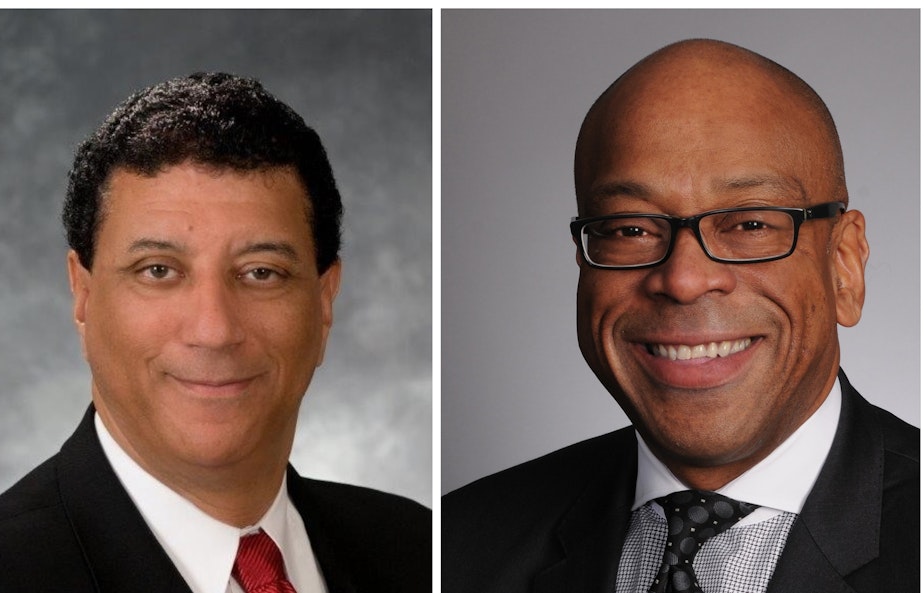‘As a police officer, I have to be able to say I am sorry’

This conversation is part of KUOW's Beyond the Protest series, led by people involved in the struggle for racial justice, from different generations and viewpoints, from protesters to police.
In this installment, we hear from John Hayes, a captain with the Seattle Police Department, and a member of the National Black Police Association. He’s been talking about the protests and policing issues with his longtime friend James Williams, a managing partner at the Perkins Coie Law Firm, and a board member of the Urban League of Metropolitan Seattle.
Hayes and Williams reflected on the police killings and racism that sparked this year's ongoing civil rights protests.
“T
he George Floyd is the one I cannot… I haven't come to grips with yet," Hayes said. "It was so sad. It was disgusting. I couldn't believe it. I was dying inside. And that officer that put his knee on his neck looked as if he had no shame for what was taking place.”
Williams chimed in.
“I totally get it. For me, it was more of a surreal experience. Because, when the Ahmaud Arbery thing happened, I was like, 'That's the craziest thing I've ever heard of: Someone going jogging, and all of a sudden getting shot because of that,'" he said. "And I’m saying, ‘Well, my goodness. Is there nothing that's a safe activity for an African American male in this country?'
Sponsored
“The surrealism started to turn into anxiety and anguish and concern, and really a sense of helplessness," Williams added. "And then the culmination of it was the George Floyd murder. I actually call it a lynching, because it was the first time I think any of us had ever seen that real time on video. When I first saw the video unfold, I had no idea that it actually was going to turn into him dying, and calling for his mother as his last breath, right there on TV, on video for everyone in the world to see.”
For Hayes, the killings represent what could happen to any Black person.
“The other part of it is, every one of these situations, you could see yourself there,” he said.
“That's exactly the other thing I was thinking, John, but for the grace of God go I,” Williams responded.
Civil unrest ensues across the nation
“What was your reaction when you saw all those protests going on?” Williams asked.
“The first thing that I thought was, I hear you," Hayes said. "I hear why you’re in the streets. I understand. I've been in the streets before, when I was much younger, for a lot of issues that took place. I understood why people were angry. What happened with me was that, with George Floyd, him and a whole range of other folks, Breonna Taylor, all of them, none of the things that they did, was marked with a death penalty.
“The other part is, being a police officer, inside of me, I wanted to make every one of those protests safe," Hayes continued. "I wanted people to be able to speak their mind, to let people know about how angry they were. I see the faces of these individuals who were marching, who were talking, who were angry, and knowing some of them had relatives who were victims of this type of crime, and received the death penalty off of something very basic.”
“They collectively — those protesters — did not allow George Floyd to die in vain,” Williams said.
"Another thing that came out of the protest was a slogan, ‘Defund the Police,’" the attorney added. "What was your reaction to that, and how did it make you feel?”
Sponsored
For Hayes' part, police accountability starts with acknowledging harm done.
“This is really a tough one, because I thought ‘Defund the Police’ was not the appropriate response," he said. "I think ‘Redirect the Police’ for what you want ... But we're going to have to find a way to say, straight up, ‘I'm sorry.’ Me, as a police officer, I have to be able to say ‘I am sorry if you've been the victim of…’ and then say, ‘Do we have room to start again?’ and ‘Let's make it right’ and ‘Let's not stop.’”
SPD Captain John Hayes and James Williams recorded this conversation for KUOW's Beyond the Protest series. Both men spoke with KUOW in a personal capacity – not on behalf of their employers. To suggest someone for our next conversation, email us at engage@kuow.org.




